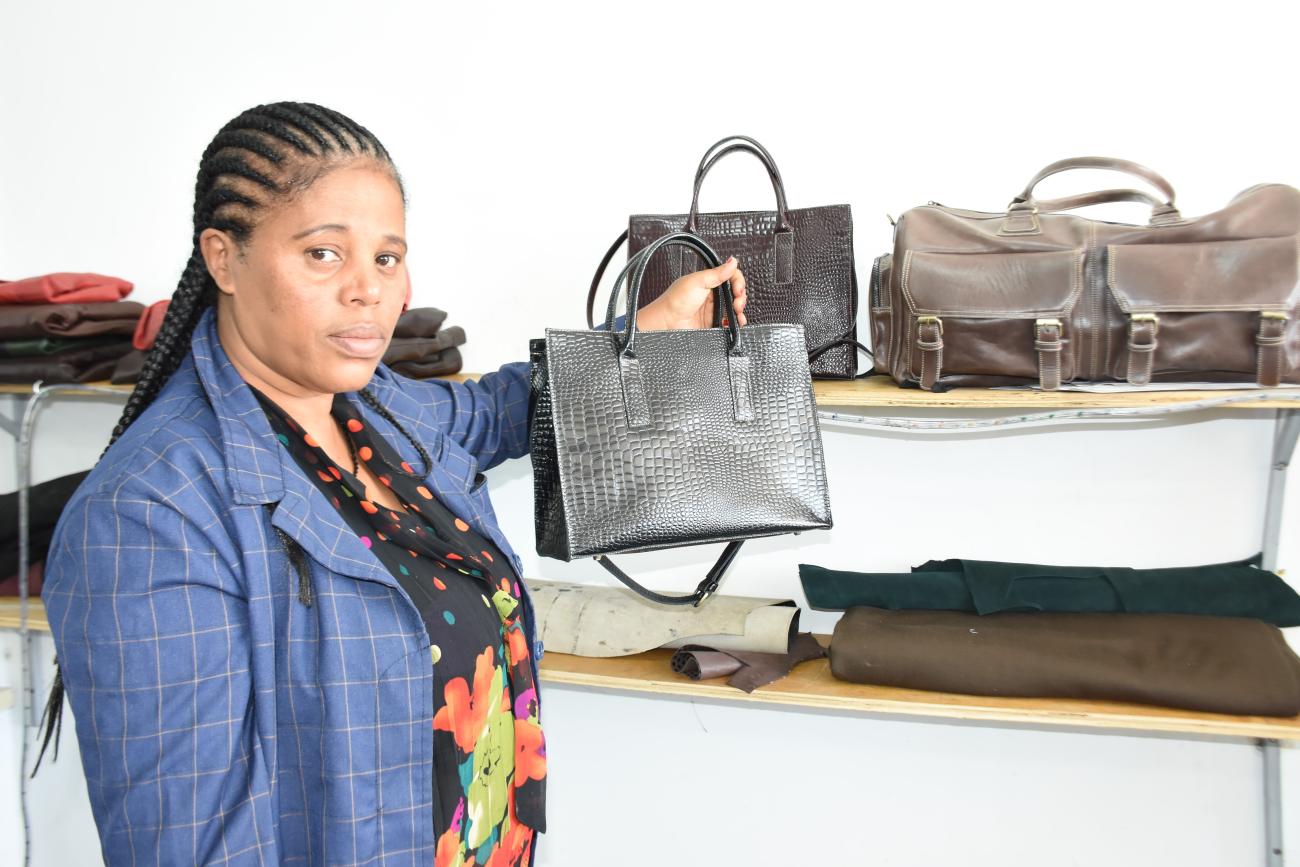Globally, SMEs account for 90 percent of businesses and 60 to 70 percent of employment. In diverse societies, they sustain livelihoods of the working poor, women, youth and most vulnerable groups. In diverse societies, they sustain livelihoods of the working poor, women, youth and most vulnerable groups.
Abaynesh, 42 and a mother of four including two adopted children, runs a small business that makes leather products in Addis Ababa.
“I was inspired by my father who used to make and repair leather sofas and vehicle seat covers. I learned the skill while supporting my father and turned it to making leather jackets in a rented shop with 5,000Birr given to me by my father.”
Five years later, she joined LOMI (lemon) Leather, an SME of 10 women members that make and sell leather jackets, bags, belts, children’s footwear and wallets.
As the Ethiopian proverb goes, ‘One lemon is precious for 50 people, but 50 lemons are a burden to one person’. The group came together by pooling resources thus enabling them to purchase leather inputs and accessories and having a voice to find markets and training opportunities.
Abaynesh commented: “Tanneries sell a minimum of 1000 square feet of leather, which is not affordable by individual entrepreneurs. We pull money together to buy this amount and share it among ourselves. In addition, as a group we find better market opportunities and buy other required accessories and tools. We manage big product orders together and share the machines and inputs we received as support.”
Started with a loan money of 5000 Birr given by her father in 2007, today Abaynesh grew her working capital to 5million and built an asset base of 10million Birr.
Her business employs 25 young people (23 females and 2 males) and produces leather products for local and export market. Abaynesh and other LOMI Leather members export mainly jackets and bags for markets in Norway, Sweden and USA.
With the aim of supporting SMEs through a cluster approach, UNIDO addressed the capacity gap of LOMI Leather with skill training, market access and technology. LOMI members benefitted from training in designing and cutting skills as well as the provision of six common use machines that are used for cutting, trimming, splitting, and softening leather.
“Upgrading of the Ethiopian Leather and Leather Products Industry”, funded by the Italian Development Cooperative (AICS), aims to increase the competitiveness and income of SMEs engaged in manufacturing leather footwear and products, targeting three selected SMEs networks in Addis Ababa. The direct beneficiaries are women and youth in disadvantaged situation deprived of access to opportunities and financial resources. In all, 12 networks have been supported with an average of 377 enterprises involving around 3800 workers.
At government institutional level, the technical groups at National, City and Sub-City levels received support in capacity building towards efficient coordination services for SMEs. Government provided incentive packages for MSMEs by providing common manufacturing workshops for reduced rent for a period of five years.
Another project “leather initiative for sustainable employment creation”, funded by the European Union, is supporting a cooperative with 125 women and youth to be engaged in leather footwear, leather goods and glove manufacturing in Modjo City. The project provides machinery, tools and skill training while government counterparts’ contributions is the common user facility to host the manufacturing workshop.
Recovery and resilience
Small businesses are themselves vulnerable to multiple shocks such as conflict, climate crisis and the impacts of global health crisis like COVID-19 which disrupted the supply chain, market access and the entire business system.
The COVID pandemic has forced LOMI and many other SME leather clusters to lose income due to reduced demand for products and increased operational expenditures. In addition, they faced difficulties related to lack of access to credit, high inflation and shortage of raw material supplies as well as tools and accessories for their machineries. As part of tackling the impact of COVID and achieve recovery, the SMEs networks were supported to sustain operation and preserve jobs. Nearly 1600 SMEs with over 2280 employees benefitted from the project funded by the Italian Project - “Sustaining Businesses and Protecting Jobs in the Informal Economy”.
“This support was crucial for my business to stay operational and maintain my employees,” said Abaynesh.
Abaynesh has advice for those interested to join the leather products business: “The sector needs interest and determination to succeed, courage, patience and hard work.”
Abaynesh’s vision for the future (in 10 years) is to increase production capacity in order to sustain exports and open leather products shops in her export destinations in Europe and USA.


